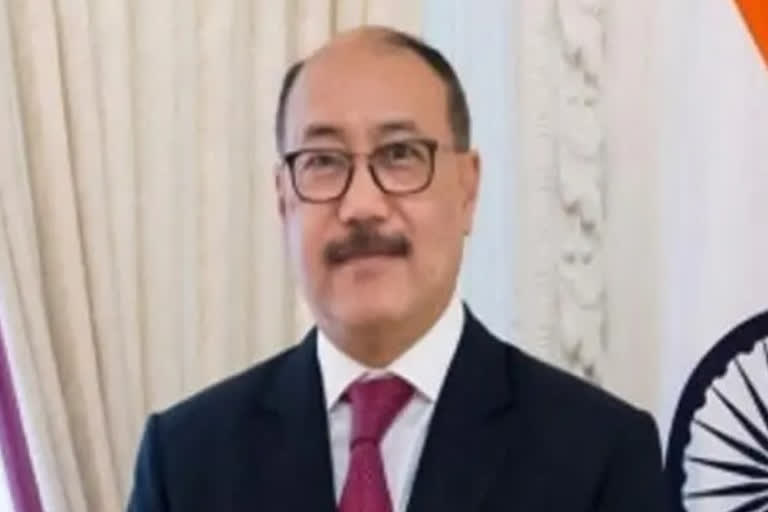New Delhi: India's foreign secretary Harsh V Shringla on Monday said BIMSTEC (Bay of Bengal Initiative for Multi-Sectoral Technical and Economic Cooperation) is a powerful engine of economic growth.
Addressing the International Symposium on “BIMSTEC: A Vehicle for Growth and Development” organized by ISCS Kolkata, Shringla said, "with 21.7% of the world population and combined GDP of US$ 3.8 trillion, BIMSTEC is a powerful engine of economic growth. During the last decade, the region has registered a compound annual growth rate (GDP growth) of 6.1%. We should collectively strive to surpass this growth rate in the current decade".
"The social and cultural linkages among people in the BIMSTEC region that began over two millennia need no introduction. As Prime Minister Narendra Modi said in his message on the occasion of the 24th BIMSTEC Day, "the people of BIMSTEC are bound by shared history and age-old cultural and civilizational linkages", he added.
He underlined that the theme of the Symposium, "BIMSTEC: A Vehicle for Growth and Development” is indeed timely as the countries try to build back after the unprecedented effect of the COVID-19 pandemic on our lives, economies and well-being of our people.
The pandemic has spared none, including the BIMSTEC countries, adding that 'the event allows us to share our experiences and learn best practices from each other in making BIMSTEC a vehicle for growth and development for all of us. BIMSTEC has an added significance for the development of our North Eastern Region'.
"The origins of BIMSTEC and India’s journey as one of its founding members have a contextual rationale. "Neighbourhood First” and "Act East” - both of which are relevant for BIMSTEC – are the cornerstones of India’s foreign policy", Shringla stated.
He said that BIMSTEC is unarguably a crucial link in connecting South and South-East Asia. "As our Prime Minister has noted, "BIMSTEC has emerged as a promising regional grouping to fulfil the common aspiration of its people and serve the shared interests of its Member States", reiterated Harsh Shringla during the event.
Read: NCB commences probe into allegations made by Mumbai cruise drugs case witness
Notably, for a long time, the BIMSTEC process was marked by a high degree of informality, without an institutional structure. It received a major thrust at the BIMSTEC Outreach Summit and Leader’s Retreat in India in October 2016 in which the Leaders agreed to work collectively to make BIMSTEC stronger, more effective and result-oriented.
Various initiatives in the key areas of security and counter-terrorism, connectivity and trade, environment and disaster management, energy and people-to-people contacts were given an impetus, providing much greater visibility to BIMSTEC and its initiatives.
Moreover, the BIMSTEC Member States adapted to the challenges of the pandemic and continued their work virtually under the guidance of the Secretary-General.
As a result, commendable progress has been made in finalizing the BIMSTEC Charter; BIMSTEC Master Plan for Transport Connectivity; BIMSTEC Convention on Mutual Legal Assistance in Criminal Matters; BIMSTEC Technology Transfer Facility (TTF); Cooperation between Diplomatic Academies/Training Institutions; and a template of Memorandum of Association for the future establishment of BIMSTEC Centres/Entities. We look forward to the next BIMSTEC Summit to adopt these documents.
Shringla further informed that the BIMSTEC Member States also agreed to rationalize priority areas of cooperation into seven sectors with each Member State leading one sector.
India has played a proactive role in building capacities of BIMSTEC Member States across various sectors of regional cooperation. At the last Summit in 2018 in Kathmandu, the Hon’ble Prime Minister of India announced several such initiatives to strengthen BIMSTEC cooperation and capacity-building in different areas.
As noted by BIMSTEC leaders, robust connectivity is an essential prerequisite for economic integration of the region with smooth cross-border movement of people and goods.
Read: Govt signs share purchase agreement with Tata Sons for Rs 18,000-cr Air India deal
The BIMSTEC Master Plan for Transport Connectivity, finalized under India’s chairmanship of the expert group last year, envisages a seamless multimodal transport system across the region with efficient transit facilities to enhance the mobility of goods and people.
This will stimulate intra-regional trade and investment in the region. It identifies 264 projects requiring an investment of USD 126 billion over a ten-year horizon from 2018–2028. Projects worth USD 55.2 billion are already at different stages of implementation.
Shringla emphasised that there is a need to collectively develop a strategy for financing and implementing the Transport Connectivity Master Plan. I am happy to note that work in this direction has already begun with ADB conducting the first consultative workshop on the financing of the Master Plan last month.
The Member States have also made progress on finalizing the BIMSTEC Coastal Shipping Agreement and the Motor Vehicles Agreement, which would provide the legal framework for enhanced connectivity in the region.
One of the priority areas of BIMSTEC cooperation is to enhance energy cooperation and expand electricity trade through the establishment of BIMSTEC Grid Interconnection. An MOU for the Establishment of the BIMSTEC Grid Interconnection was signed at the Fourth BIMSTEC Summit.
Foreign Secretary noted tha the tourism industry is one of the most adversely affected sectors of the economy due to the pandemic. In this context, collaboration in intra-regional tourism will be an important facet of post-COVID recovery. As the situation normalizes, strong emphasis shall be laid on developing the BIMSTEC brand of tourism.
"Next year is going to be the silver jubilee year of the establishment of the BIMSTEC. The occasion allows us to reinforce our efforts in raising the level of our cooperation and economic integration," he added.
Shringla said that India remains strongly committed to further building the momentum towards deepening regional cooperation under the BIMSTEC framework and assiduously working towards making the organization stronger, more vibrant, more effective and result-oriented.
The participation of BIMSTEC Leaders at the Indian Government's swearing-in ceremony in May 2019 was a testament to the importance attached by India to BIMSTEC.
Read: Facebook's language gaps weaken screening of hate, terrorism



